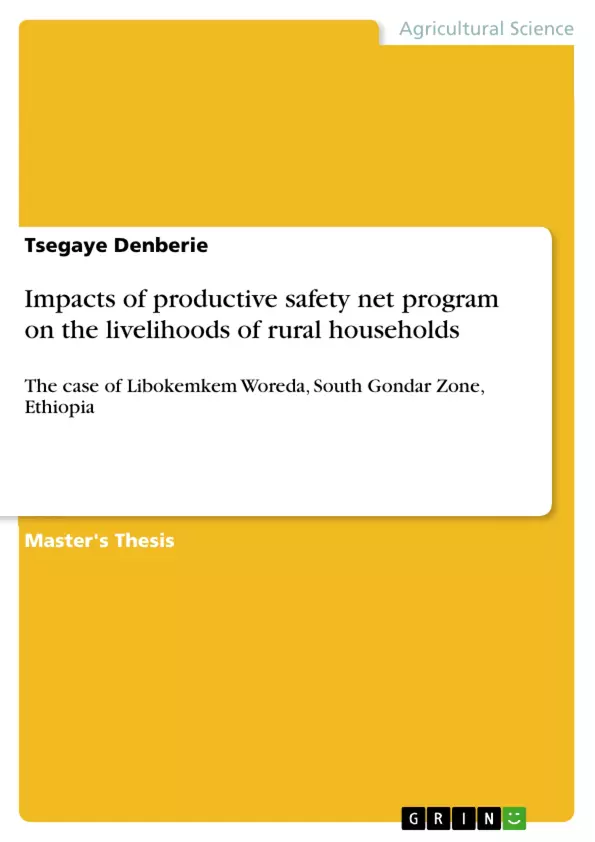This study evaluated the impact of productive safety net program on the livelihood of rural households of Libo Kemkem woreda. Towards this end, data were collected from 210 randomly selected households of which 119 were program participants and 91 were non-program participant’s selected from four Kebeles of the woreda, where the productive safety net program was implemented.
Data were analyzed using descriptive statistics and econometric analysis. Results from descriptive statistics revealed that among program participants and non participants, the total annual income has increased averagely by 14467.2 birr and 11469.2 birr. The average livestock holding was 3.7230 TLU and 1.4878 TLU for participant and non-participant households, respectively. Thus, the program enables them to through avoidance of forced disposal in response to shock (increase) their livestock holdings.
Applying a propensity score matching technique, it was found that the program has significantly increased participating households’ total income by 59.1%, livestock asset by 14.09% and consumption expenditure by 22.61% compared to non-participating households.
The estimated results also revealed that, households in the program has better access to credit, small land size and better access on agricultural extension, access to aid and less access to irrigation. Finally, physical and biological conservation measures should be widely incorporated, access to extension service for the utilization of new technologies and for policy concern. Generally both households increase their livelihood activities respectively interms of livelihood.
Inhaltsverzeichnis (Table of Contents)
- Introduction
- Background of the Study
- Statement of the Problem
- Objectives of the Study
- General Objective
- Specific Objectives
- Research Questions
- Significance of the Study
- Scope of the Study
- Organization of the Study
- Literature Review
- Conceptual Framework of Productive Safety Net Program
- Review of Previous Studies on PSNP
- Livelihood Framework and Livelihood Assets
- Methodology
- Study Area
- Sampling Techniques and Sample Size
- Data Collection Methods
- Data Analysis Techniques
- Results and Discussion
- Socio-Economic Characteristics of Households
- Impacts of PSNP on Livelihood Assets
- Impacts of PSNP on Livelihood Outcomes
- Factors Affecting Household Livelihood Outcomes
- Conclusions and Recommendations
Zielsetzung und Themenschwerpunkte (Objectives and Key Themes)
This thesis aims to investigate the impact of the Productive Safety Net Program (PSNP) on the livelihoods of rural households in the Libokemkem Woreda of the South Gondar Zone in Ethiopia. The study seeks to understand how PSNP interventions influence livelihood assets and outcomes among rural households.
- Impact of PSNP on Livelihood Assets
- Impact of PSNP on Livelihood Outcomes
- Factors Affecting Household Livelihood Outcomes
- Livelihood Framework and Livelihood Assets
- Conceptual Framework of Productive Safety Net Program
Zusammenfassung der Kapitel (Chapter Summaries)
- Introduction: This chapter introduces the research topic, outlining the background of the study, statement of the problem, objectives, research questions, significance, scope, and organization of the thesis.
- Literature Review: This chapter provides a comprehensive review of relevant literature on PSNP, livelihood frameworks, and livelihood assets, setting the theoretical foundation for the study.
- Methodology: This chapter outlines the study's methodology, including the study area, sampling techniques, data collection methods, and data analysis techniques.
- Results and Discussion: This chapter presents the findings of the study, analyzing the socio-economic characteristics of households, the impacts of PSNP on livelihood assets and outcomes, and the factors affecting household livelihood outcomes.
Schlüsselwörter (Keywords)
The main keywords and focus topics of the text are: Productive Safety Net Program (PSNP), rural households, livelihoods, livelihood assets, livelihood outcomes, Ethiopia, Libokemkem Woreda, South Gondar Zone, impact assessment, socio-economic characteristics, factors affecting livelihoods, policy implications.
- Quote paper
- Tsegaye Denberie (Author), 2018, Impacts of productive safety net program on the livelihoods of rural households, Munich, GRIN Verlag, https://www.grin.com/document/412452



